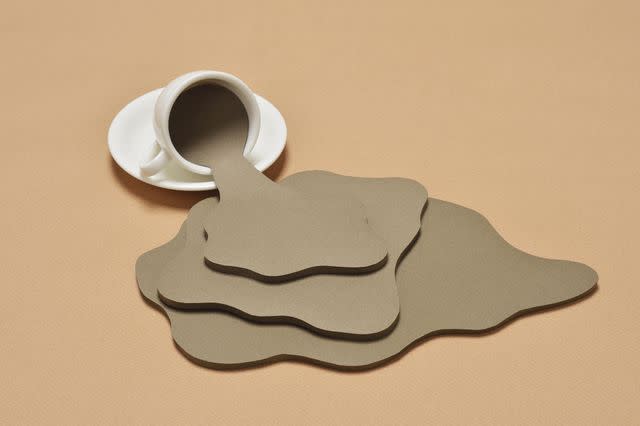Does Coffee Cause Inflammation? We Asked an RD
Here’s what you need to know.
Waking up with a cup of coffee may be your tried and true morning ritual. But do you feel your best after caffeinating? Inflammation, especially over time, has been a hot topic for those looking into their healthy eating and living practices, and it may impact the way you enjoy your favorite beverage.
To understand if you’re experiencing inflammation, here’s a little background on inflammation, including the different types. “Inflammation is the body’s immune system’s response to an irritant, where it starts to recognize and remove harmful components and starts the healing process,” explain Lyssie Lakatos, RDN and Tammy Lakatos Shames, RDN, also known as The Nutrition Twins. “Acute inflammation is a response to sudden damage in the body, like a sprained ankle, where the body sends inflammatory compounds to the injured area to protect it. Chronic inflammation is when your body continues to send inflammatory compounds even though the body is no longer in danger, and it starts to damage the body’s tissues and cells.” Chronic inflammation, or long-term inflammation, is linked with chronic disease. Additionally, chronic inflammation makes it harder to lose weight and easier to gain weight, which is why it’s a concern for many in the health and nutrition community.

Yagi Studio/Getty Images
Related:How to Start Eating More Anti-Inflammatory Foods—and Why It's So Important
Luckily, sipping coffee may actually help acute or chronic inflammation, not cause it to flare up. “Coffee actually seems to reduce inflammation [according to a 2019 scientific review] and not cause it,” say The Nutrition Twins. “Coffee’s unique mixture of compounds and antioxidants, like chlorogenic acid, caffeine, cafestol, kahweol, and trigonelline, appear to play a part in reducing inflammation.
“And beyond reducing inflammation, drinking coffee can also help reduce risk of diseases in which inflammation plays a role in their progression, like heart disease, diabetes, and cancer,” The Nutrition Twins say. However, this may not be true for all people. “Keep in mind that some people are genetically inclined to be sensitive to caffeine, and for these people, coffee may create inflammation due to its caffeine content,” the pair adds.
Related:What's the Difference Between Cold Brew, Pour-Over, and More Types of Coffee?
Drinking your coffee black, both hot and iced, can be anti-inflammatory. However, once you add sweeteners or dairy products—sugar, syrup, cream, or a whipped topping—you’re introducing pro-inflammatory components into your coffee, which trigger pro-inflammatory cytokines. “Additives like sugar cause low-grade chronic inflammation that is linked with autoimmune disease and other chronic diseases,” The Nutrition Twins state, citing a 2022 study that appeared in the medical journal, Frontiers in Immunology.
If you have a sweet tooth, the duo suggests flavoring your coffee with a sprinkle of cinnamon for natural sweetness, which will also increase the antioxidants in your cup. Adding a splash of unsweetened almond milk or another nut milk also shouldn’t negate the anti-inflammatory benefits of coffee. “Just don’t overdo it on your coffee servings, especially if you are jittery after drinking caffeine,” The Nutrition Twins add. “Moderation is the key.”
Related:How to Grind Coffee Beans at Home For Barista-Quality Coffee Every Morning
If you’re sensitive to caffeine or coffee, The Nutrition Twins also recommend green tea, which is extremely anti-inflammatory as well. “Although there is caffeine in green tea, it is much lower than in coffee, and the polyphenols in green tea have potent anti-inflammatory properties.”
For more Real Simple news, make sure to sign up for our newsletter!
Read the original article on Real Simple.
